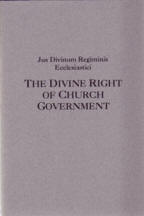 Reviewed by Credenda/Agenda, vol. 8 #1. Jus Divinum is just full of great stuff. Originally written at the time of the Westminster Assembly, the book was offered in defense of two central propositions. The first was that god has, in fact, revealed His will in Scriputre concerning the government he intends for His church to have. Church government is not a subject where we are free to devise a system which we may think meets our needs. The title reflects the conviction of the writers that we are to govern our churches jure divino — according to the law of God.
Reviewed by Credenda/Agenda, vol. 8 #1. Jus Divinum is just full of great stuff. Originally written at the time of the Westminster Assembly, the book was offered in defense of two central propositions. The first was that god has, in fact, revealed His will in Scriputre concerning the government he intends for His church to have. Church government is not a subject where we are free to devise a system which we may think meets our needs. The title reflects the conviction of the writers that we are to govern our churches jure divino — according to the law of God.
The second proposition, and the one occupying the bulk of the book, is that presbyterian government is that revealed form of government. The authors show the biblical necessity of ruling elders, the biblical warrant for regional presbyteries, the scriptural need for provincial, national, and ecumenical synods, the separation of church and state, and the true nature of ecclesiastical government. These men were careful exegetes and theologians, and their work is a treasure.
Given the level of tension in England at that time, this work is remarkably irenic. The writers begin their work by saying, “Things are handled rather by way of Positive Assertion than Polemical Differentiation (which too commonly degenerates into verbal strifes, 1 Tim. 6:3-4, 2 Tim. 2:23, and vain-jangling, 1 Tim. 1:6); and where any dissenting opinions or Objections are repelled, we hope it is with that sobriety, meekness and moderation of spirit that any unprejudiced judgement may perceive we had rather gain than grieve those that dissent from us. We endeavor rather to heal up than to tear open the rent, and we contend more for Truth than for victory.”
The style of writing may be initially difficult for the modern reader, but the gold which can be mined here is more than sufficient to reward perseverance in study.
This classic reprint was revised, edited, and introduced by David Hall. He deserves our thanks and gratitude for making such a valuable work available again.
